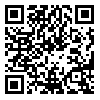Volume 19, Issue 60 (4-2025)
MLJ 2025, 19(60): 567-582 |
Back to browse issues page
Download citation:
BibTeX | RIS | EndNote | Medlars | ProCite | Reference Manager | RefWorks
Send citation to:



BibTeX | RIS | EndNote | Medlars | ProCite | Reference Manager | RefWorks
Send citation to:
Torabi M, Hossieni S M H , S H S S M R, Habibi Savadkoohi S, Razavi S M. Medical and Pharmaceutical Support for Vulnerable Groups in the International Human Rights System with an Emphasis on Alavi's Views. MLJ 2025; 19 (60) :567-582
URL: http://ijmedicallaw.ir/article-1-1826-en.html
URL: http://ijmedicallaw.ir/article-1-1826-en.html
Mohammad Torabi1 
 , Seyed Mohammad Hossieni1, Saber Habibi Savadkoohi1, Seyed Mohammad Razavi1 Hossieni *1
, Seyed Mohammad Hossieni1, Saber Habibi Savadkoohi1, Seyed Mohammad Razavi1 Hossieni *1 

 , Saber Habibi Savadkoohi1
, Saber Habibi Savadkoohi1 
 , Seyed Mohammad Razavi1
, Seyed Mohammad Razavi1 


 , Seyed Mohammad Hossieni1, Saber Habibi Savadkoohi1, Seyed Mohammad Razavi1 Hossieni *1
, Seyed Mohammad Hossieni1, Saber Habibi Savadkoohi1, Seyed Mohammad Razavi1 Hossieni *1 

 , Saber Habibi Savadkoohi1
, Saber Habibi Savadkoohi1 
 , Seyed Mohammad Razavi1
, Seyed Mohammad Razavi1 

1- Department of Law, South Tehran Branch, Islamic Azad University, Tehran, Iran.
Abstract:
Background and Aim: Medical and pharmaceutical support for vulnerable groups in the international legal system is one of the rights related to the right to health. Of course, this support includes both support for the physical health and mental health of vulnerable groups. Vulnerable groups, of course, do not have a specific definition in the international legal system and are divided based on social, economic, cultural and even individual factors. For example, in one division, drug addicts are considered vulnerable groups that some doctors do not want to treat, especially when they are infected with infectious diseases such as measles. The objectives of this research are, first, to identify the medical and pharmaceutical rights of vulnerable groups from the perspective of the international legal system, secondly, to outline the views of Imam Ali (AS) regarding medical and pharmaceutical support for vulnerable groups and finally, to reconcile the Alawi approach and the existing approach in the international legal system regarding medical and pharmaceutical support for vulnerable groups.
Method: This research is theoretical and the research method is descriptive-analytical. The method of collecting information in it is library-based and is done by referring to documents, books and articles.
Ethical Considerations: In the present research, the principles of trustworthiness, honesty, impartiality and originality of the work have been observed.
Results: The root of attention to medical and pharmaceutical support for vulnerable groups is related to the relationship between public health and human rights, in such a way that due to the irreparable nature of violations of public health, any provision of health and treatment services to these groups is prioritized. On the other hand, in the Alawite intellectual system, in addition to physical and mental health, governments have the obligation to provide and guarantee the right to spiritual health for vulnerable groups, especially since these groups are exposed to a lower quality of this dimension of health due to economic, social and educational poverty.
Conclusion: In relation to vulnerable groups, various types of medical and pharmaceutical support for vulnerable groups in the international legal system can be mentioned, including making medical centers available for women or children, training doctors specializing in children and women and making medical and pharmaceutical services free for vulnerable groups. From the Alawite perspective, the issue of various supports for vulnerable groups, whether material or spiritual support, has also been emphasized, so that the most important of them can be seen in the recommendations of Imam Ali (AS) addressed to Malik Ashtar in Nahjul-Balagha.
Please cite this article as:
Torabi M, Hossieni SM, Habibi Savadkoohi S, Razavi SM. Medical and Pharmaceutical Support for Vulnerable Groups in the International Human Rights System with an Emphasis on Alavi's Views. Medical Law Journal. 2025; 19: e38.
Method: This research is theoretical and the research method is descriptive-analytical. The method of collecting information in it is library-based and is done by referring to documents, books and articles.
Ethical Considerations: In the present research, the principles of trustworthiness, honesty, impartiality and originality of the work have been observed.
Results: The root of attention to medical and pharmaceutical support for vulnerable groups is related to the relationship between public health and human rights, in such a way that due to the irreparable nature of violations of public health, any provision of health and treatment services to these groups is prioritized. On the other hand, in the Alawite intellectual system, in addition to physical and mental health, governments have the obligation to provide and guarantee the right to spiritual health for vulnerable groups, especially since these groups are exposed to a lower quality of this dimension of health due to economic, social and educational poverty.
Conclusion: In relation to vulnerable groups, various types of medical and pharmaceutical support for vulnerable groups in the international legal system can be mentioned, including making medical centers available for women or children, training doctors specializing in children and women and making medical and pharmaceutical services free for vulnerable groups. From the Alawite perspective, the issue of various supports for vulnerable groups, whether material or spiritual support, has also been emphasized, so that the most important of them can be seen in the recommendations of Imam Ali (AS) addressed to Malik Ashtar in Nahjul-Balagha.
Please cite this article as:
Torabi M, Hossieni SM, Habibi Savadkoohi S, Razavi SM. Medical and Pharmaceutical Support for Vulnerable Groups in the International Human Rights System with an Emphasis on Alavi's Views. Medical Law Journal. 2025; 19: e38.
Keywords: Medical Support, Pharmaceutical Support, Right to Health, Vulnerable Groups, Alawite Perspective
Type of Study: Original Article |
Received: 2024/05/29 | Accepted: 2025/03/9
Received: 2024/05/29 | Accepted: 2025/03/9
Send email to the article author
| Rights and permissions | |
 |
This work is licensed under a Creative Commons Attribution-NonCommercial 4.0 International License. |



